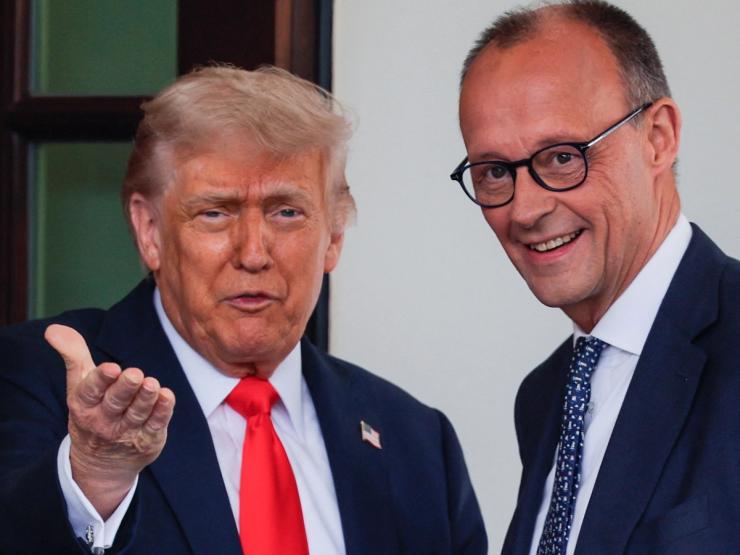On Thursday afternoon, President Donald Trump staged the latest episode in a series of riveting Oval Office encounters with leaders of other countries — ones in which, it’s become clear, anything could happen. Volodymyr Zelenskyy got a scolding. Cyril Ramaphosa got a video and a lecture. And Friedrich Merz got a friendly bit of ribbing on German rearmament.
There’s more to these public encounters than Trump gets credit for, something his old ally Steve Bannon has pointed out. Americans have lost trust in their leaders, and Trump’s public foreign policy, whatever its flaws, is an unprecedented, transparent show of the real, chaotic, impulsive workings of power.
The public can’t worry about backroom deals and conspiracies when the whole thing is conducted on a studio set, the thinking goes. There the walls are plywood, the doors lead nowhere, and there are no backrooms.
The warm Merz encounter turned out just to be the preview to Thursday’s main show, the public breakdown of the most important personal relationship in the world: between Trump and Elon Musk.
The two men posted furiously at one another, each sticking to the social media platform he owned. After Trump Truthed that he was “disappointed” in Musk, the billionaire posted on X about Trump’s “ingratitude.” Trump said Musk had gone “CRAZY.” Musk dropped “the really big bomb”: declaring, without supplying evidence, that Trump’s name appeared in the “Epstein files.” (The site’s voice of reason, radical MAGA activist Laura Loomer, pointed out that if the Justice Department had evidence of Trump’s secret crimes, the Biden administration would presumably have used it.) Trump threatened to cut Musk’s government contracts. Musk threatened to delay his private space program.
What, exactly, are journalists — with our sources, our access, our experience — supposed to do here? I spent the early afternoon frantically blowing up the phones and Slacks of my colleagues in Washington, sending them, naturally, tweets. We found ourselves navigating an impossible loop: Our sources, like so many random people on X, were joking about Trump deporting Musk over allegations he’d violated immigration rules early in his career. Within minutes, Bannon had transformed that joke into a statement to the New York Times, making it capital-N News.
The most plugged-in people in Washington are reading the same tweets you are, marveling. The persons-familiar who populate so much of the reporting about Trump are no more or less familiar with his Truths than you are, and are speculating on his plans and motives — Is this breach final? Will it heal soon? — just the same as many Americans.
This is a feature of a presidency that sees itself as media: Journalists can become mere television critics.
Of course, the White House isn’t a stage set. (That’s just the moon landing.) The doors lead to offices and SCIFs, and the decisions at some point spill into legislation and the economy and into people’s lives — a reality that, most days, keeps journalists in business.
But on some days, like this one, all we can do is try to help you understand the show we’re all watching together.


